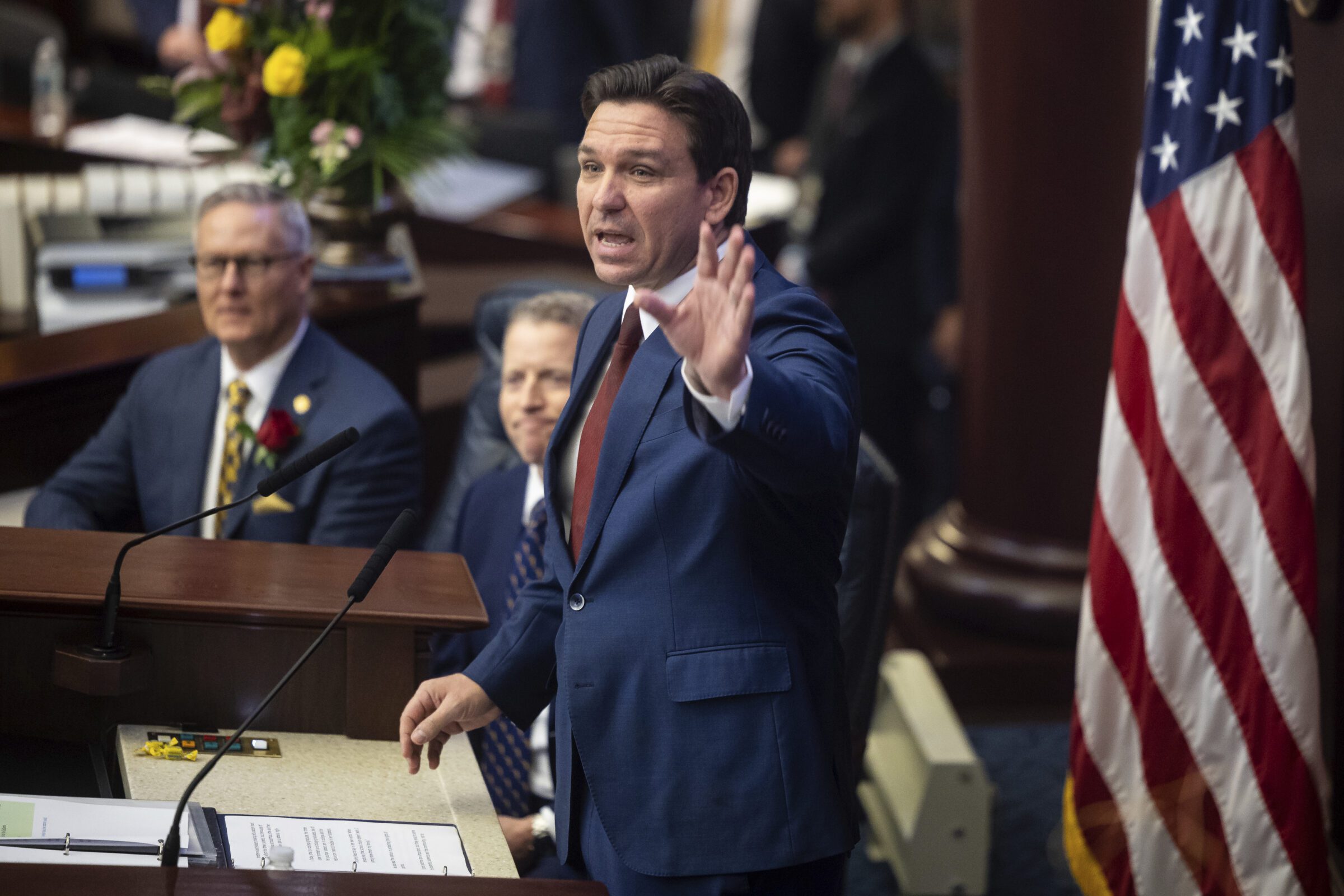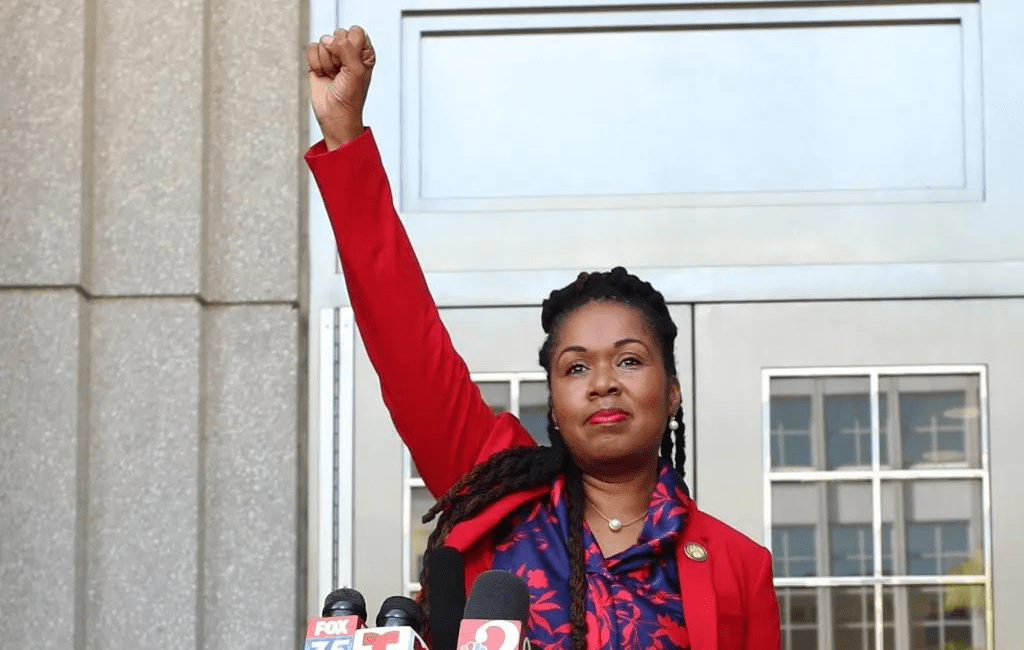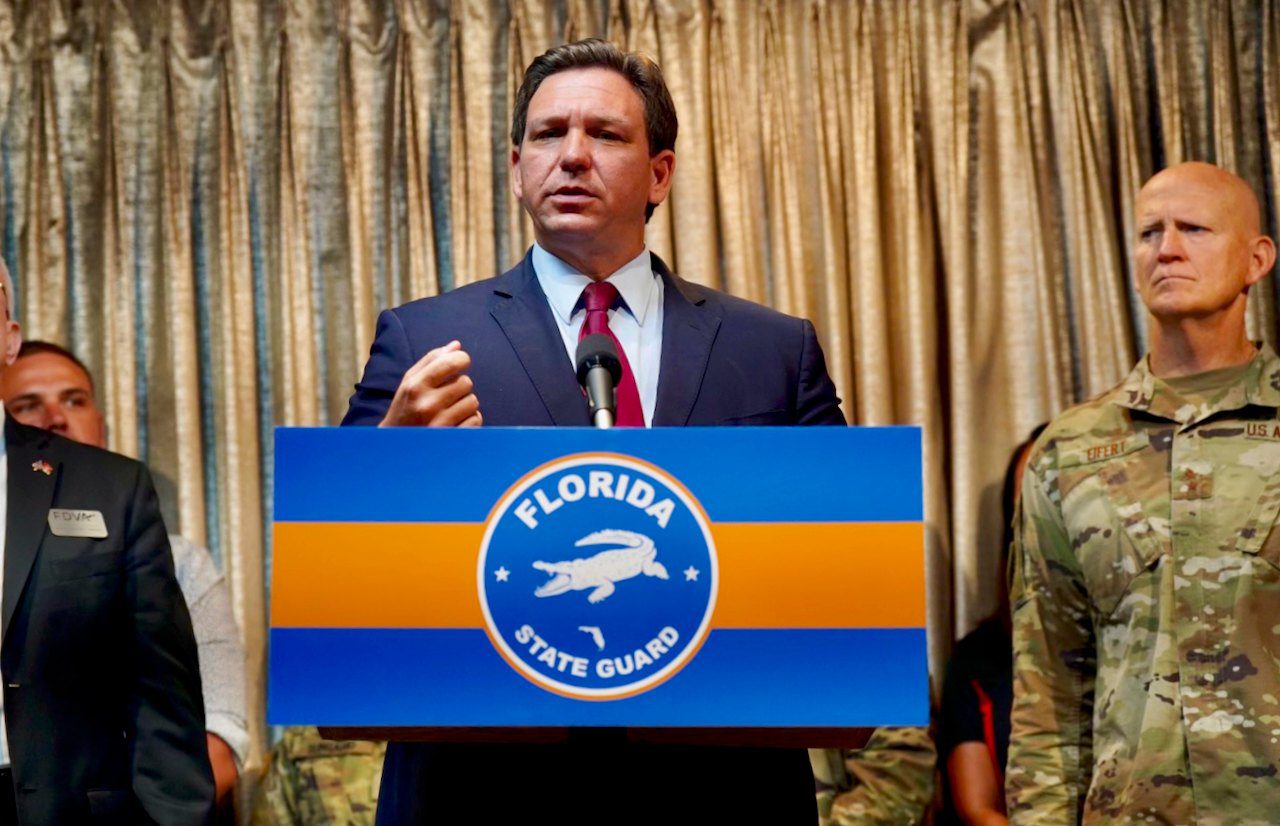In Florida GOP’s New Immigration Crackdown, a Familiar Play of Overriding Local Democracy
Republicans are ramping up requirements that Florida’s local officials cooperate with ICE, and giving Ron DeSantis more cover to remove them from office if they don’t comply.
| February 12, 2025

Florida Republicans spent weeks squabbling over rival immigration bills. Their conflict wasn’t over significant policy differences: They agreed on diverting hundreds of millions in state funds toward assisting federal immigration enforcement, mandating that local governments cooperate with ICE, and punishing officials who don’t comply. But Governor Ron DeSantis and legislative leaders were clashing on who should have the power to marshal this crackdown.
They finally united this week around a proposal to create a new state board that’ll get to monitor whether Florida’s local officials are complying with President Trump’s deportation agenda.
The proposal also gives DeSantis more cover to punish officials who are deemed to not be complying by removing them from office. Over the years, DeSantis has already claimed extensive powers to suspend elected officials with whom he disagrees, including school board members and Democratic state attorneys.
Civil rights groups and other critics of the GOP’s approach on immigration warn that it will drastically scale up state preemption and harm immigrant communities. More than that, some also faulted DeSantis’ singular focus on getting to decide who can serve in office.
“This is a governor that looks for any reason to remove people when he can,” state Representative Anna Eskamani, a Democrat, told Bolts. “It speaks to a trend of the consolidation of power among the few. It is incredibly unsettling to have that happen to our democracy.” Eskamani represents parts of Orange County (Orlando), whose prosecutor, Monique Worrell, DeSantis suspended in 2023; Worrell won the office back in an election last fall, but some local Republicans have said the governor could suspend her again.
“It erodes that ability to decide who serves you and what values they will lead with.” Eskamani said. “The idea is to scare people into submission.”
Lawmakers convened in a lightning-speed special session on Tuesday, just one day after GOP leaders unveiled their deal. They’re meeting for the sole purpose of debating this package of legislation, and are expected to pass it by the end of the session this Friday. DeSantis supports the bills and would likely sign them into law. (Editor’s note: The legislature passed these bills within days, and DeSantis signed them into law on Thursday, Feb. 13.)
“We have a responsibility to enact policies that will help end the illegal immigration crisis once and for all,” DeSantis said in a statement on Monday.
The special session comes as the second Trump administration makes a show of ramping up ICE arrests. Under his first presidency, many localities significantly slowed the pace of deportations with sanctuary protections and stopped police and sheriff’s deputies from working with federal agents. Since then, many GOP-led states have adopted new legislation to preempt their cities and counties from limiting cooperation with ICE. North Carolina adopted a law to override some county sheriffs’ policies of not detaining people for ICE, for instance, while Tennessee just created criminal penalties for local officials who support sanctuary policies.
Trump, too, has targeted sanctuary localities since returning to power. His administration sued the city of Chicago and the state of Illinois last week in an attempt to dismantle their protections, and it has started to explore prosecuting officials who refuse to work with ICE.
Florida Republicans are already prone to force the hands of local governments. Last year, they barred municipalities from increasing the minimum wage and regulating heat exposure, and they gutted local civilian police oversight boards. On immigration, they adopted laws in 2019 and 2022 that required local law enforcement to assist ICE; heading into 2025, they signaled that they would expand those mandates. For Kara Gross, legislative director for the ACLU of Florida, such laws “are designed to inflict maximum harm on Florida’s immigrant communities. They erode local control and force compliance through coercion, threats, and penalties.”
The legislative package unveiled this week ramps up immigration enforcement and state preemption. It blocks undocumented residents from qualifying for in-state tuition, provides for higher criminal penalties against undocumented immigrants, and requires pretrial detention when an undocumented defendant is accused of so-called forcible felonies. It mandates the death penalty for any undocumented defendants convicted of a capital crime despite legal precedents that imposing death sentences automatically is unconstitutional.
It also steers $250 millions of dollars of state funds toward local law enforcement to assist ICE, and it requires that agencies and local governments take on more immigration activities. It sets up a new State Board of Immigration Enforcement to monitor if these local and state officials are obeying; the board will be composed of Florida’s governor, agriculture commissioner, attorney general, and chief financial officer.
If local or county officials are not complying, the legislation says a court may impose a fine. But it also specifies that the governor may suspend them from office.
That matches the fears of DeSantis’ critics. “Many school administrators are worried about their elected board members being removed if they don’t follow instructions by ICE,” Eskamani said.
School boards nationwide have taken action to limit ICE agents’ access to schools and instruct public schools to impede ICE visits. But in Florida, that may put local officials in the state’s line of fire. Eskamani says the fear of retribution is already shaping how school boards and principals are setting policies around whether to allow ICE into schools without a judicial warrant and that she has spoken to school board members who are “nervous and hesitant to speak publicly” about protecting immigrant students.
Thomas Kennedy, an advocate with the Florida Immigrant Coalition, echoed Eskamani’s concern. “I’ve been talking to school administrators and local elected officials,” he told Bolts. “They are terrified that if they don’t comply they will get removed from office.”
These threats may also affect sheriffs and other officials who try limiting how law enforcement responds to ICE, which has been a relatively common response elsewhere. Florida’s existing requirements that law enforcement help ICE within county jails has chilled earlier talk of reforms. Still, sheriffs in Broward and Palm Beach counties have pledged they would not deploy officers to participate in ICE raids or carry out border enforcement duties on behalf of federal agencies. DeSantis this week directed state troopers to carry out new activities like questioning drivers on their immigration status during traffic stops and detaining them if they are undocumented.
“He wants the power to execute his own immigration enforcement with unchecked power,” Kennedy said of the governor.
DeSantis did not reply to a request for comment on how he’d use his enforcement powers under the new legislation.
Florida’s constitution already gives the governor the unusual power to suspend officials in a narrow set of circumstances, such as the commission of certain crimes and what the constitution calls “neglect of duty.” DeSantis has stretched and tested the limits of this removal power over his six years in office, most notably by ordering the removal of two prosecutors whose policies conflicted with his tough-on-crime brand and rightwing agenda.
Prosecutors typically have a lot of leeway to decide which cases to prosecute, when to seek bail, and when to push for enhanced sentencing. But in the summer of 2022, DeSantis pointed to a suite of policy announcements by Hillsborough County State Attorney Andrew Warren to accuse him of abandoning his duties and suspend him. Warren had said he would not prosecute cases involving abortion and anti-transgender laws, and he’d curtailed prosecuting bike and pedestrian stops conducted by the Tampa police. The governor used the tactic again in 2023 to suspend Worrell, Orlando’s top prosecutor, arguing that her reforms aimed at keeping minors out of the prison system amounted to “neglect of duty and incompetence.”
Worrell and Warren both sued to be reinstated. They argued that their decisions were squarely within the discretion of their office, and not a breach of their duties, but the Florida Supreme Court sided with DeSantis in both cases. A federal appeals court ruled last year that DeSantis punished Warren for political activity protected by the First Amendment, but they did not reinstate him, instead ordering a new trial that was rendered moot after Warren was defeated in his bid to return to office last fall. DeSantis has also removed other officials, including school board members and the Broward County sheriff, often replacing them with Republican replacements.
The new legislation would give DeSantis more leeway to use this power. It defines noncompliance with federal immigration officers as a neglect of duty. And it amends existing statutes to specify explicitly that, when an officer “violates his or her duties” on immigration, a “potential suspension from office” is an appropriate response by the governor.
“The governor could claim that you have breached the law by not following ICE enforcement,” Eskamani said. “If you disobey an order from ICE, then you can be accused of breach of duty and face removal.”
Said Gross, “This legislation is a clear attempt to silence local leadership.”
It took weeks of infighting for the GOP to get to this point.
DeSantis initiated the showdown by rushing lawmakers to Tallahassee in late January for a special legislative session and asking them to take up his proposals on immigration. Republican legislative leaders rebelled by closing the session just moments after it began and convening a new session around a competing immigration bill, the Tackling and Reforming Unlawful Migration Policy, or TRUMP, Act. With the support of most GOP lawmakers, the legislature adopted the bill within two days.
The rebuke marked a turning point in DeSantis’ influence over legislators, whose loyalty began to slip last year after the governor’s presidential bid against Trump soured his standing with MAGA conservatives.
The TRUMP Act contained many of the same provisions as the package DeSantis had championed. But they differed over who should be top dog on immigration. DeSantis wanted his office to have the authority to monitor compliance. Instead, the TRUMP Act gave some of that authority to another statewide official: It designated Florida’s commissioner of agriculture as the state’s new chief immigration officer.
The current commissioner, Wilton Simpson, is a political rival of DeSantis who endorsed Trump over him during the 2024 presidential election.
DeSantis called the bill “grotesque” and “weak, weak, weak,” arguing that Simpson’s background as a farmer and his position overseeing an industry that relies heavily on low-wage labor would make him soft on immigration. “It is almost like the fox is guarding the henhouse,” DeSantis said in a video posted to X deriding the TRUMP Act.
The GOP’s new deal resolves DeSantis and Simpson’s power struggle by making them share some authority alongside other Cabinet members. But the power to remove officials remains in the governor’s hands. The legislature’s prior bill, the TRUMP Act, said the governor should act based on the recommendations of the agriculture commissioner, but that language is gone from the compromise legislation. “It does spread some of the authority on immigration issues,” Eskamani said. “But at the end of the day, Governor DeSantis has a track record of removing people and is going to continue to do that.”
For immigrant rights advocates, these are all distinctions without a difference: They doubt that DeSantis would feel many restrictions on his power no matter who the law defines as immigration chief. They fear that the Florida Supreme Court, whose members were mostly appointed by DeSantis, will continue to let the governor do what he wants.
“He is willing to stretch his interpretation of the ability of a governor to do that,” said Kennedy, of the Florida Immigrant Coalition. “It has created a culture of fear and intimidation.”
Sign up and stay up-to-date
Support us
Bolts is a non-profit newsroom that relies on donations, and it takes resources to produce this work. If you appreciate our value, become a monthly donor or make a contribution.




